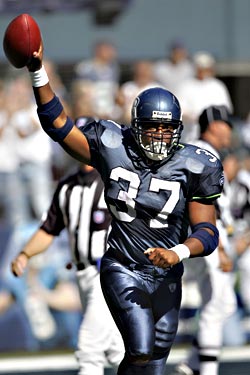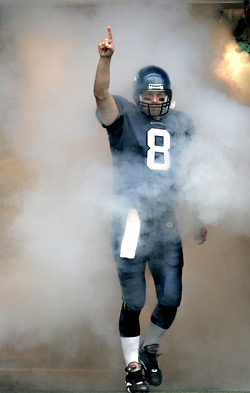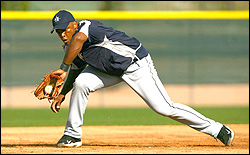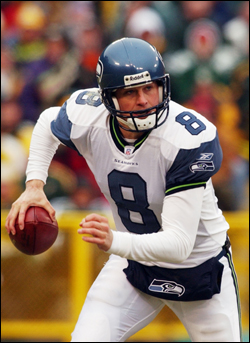BOB MELVIN LOSES six of nine to San Diego and Texas, and talk persists that he’ll be American League manager of the year. Rick Neuheisel wins 20 grand on a basketball “auction” (his euphemism for “bet”), and everybody wants to give him the Iraq vacancy on the Axis of Evil. The difference? It’s probably character. BoMel, as his many admirers know him, has some; Slick, as preferred by his many critics (several hundred new ones are born daily in Oregon alone), is one.
Otherwise, the similarities between Robert Paul Melvin and Richard Gerald Neuheisel Jr. are stunning. Born in 1961 to prosperity and privilege, they both enjoyed childhoods that were ceaseless days of play. Sunbelt hunks when they were eligible, both are well educated and better at most endeavors (scratch golfers, to name one example) than many are at just one. Articulate and funny when they want to be, both would seem to be ideal leaders of men. Bob’s guys say they’re crazy about him; University of Washington players wish it would be Rick on the sidelines when the Huskies say hello (and possibly a quick goodbye) to Columbus and the 2003 season in their opener against defending nat-champ Ohio State on Aug. 30.
But there are the differences. Melvin, by many a reckoning, has the best field-boss job in baseball. His Mariners are stable and successful, with a benevolent front office and a fan base that contradicts baseball’s general decline in spectators. The Mariners, from Edgar “Poppy” Martinez and Jamie “Methuselah” Moyer down to the greenest sprouts on the farm, are poised to be competitivemaybe even dominantfor years to come. They remind some of the ’60s-era Dodgers, and Melvin looks for all the world like the Walter Alston to keep them perennially World Series-bound.
THEN, OF COURSE, there’s the disparaged Rick Neuheisel (or “Risk New-Lies-All,” as some know him), who used to have what many would have said (though maybe not anymore) was one of the best jobs in college football. I suggested last fall, well before the second and third whiffs that struck him out at Huskyville, that Neuheisel always seems to be looking into the distance to see something better for him out there. The average cheap-seat schmuck must wonder what’s wrong with a coveted coaching job, a terrific wife, great kids, lots of dough (from salary and “auctions”), a $5 million lake palace, and enough friends, fans, and sycophants to keep him feeling adored. I wrote that Rick is a terrific starter but fails when the finish line is in sight. This, again, was months before the second strike: the lied-about rendezvous with 49ers brass in San Francisco. Accounts of Rick’s sit-down with the brain trust indicate that the 49ers’ top guys knew within five minutes that Neuheisel hadn’t even bothered to prepare for a bare- minimum job interview, let alone show he could coach in the pros. Did he really think they’d offer him the 49ers because he’s cute?
Neuheisel, it has been well reported, has been working his way toward unemployment since the malfeasances of the Colorado coaching years. He still seems to believe “three strikes and you’re out” doesn’t apply to him. He continues, as of this writing, to scorch the earth, demanding bonus pitches from his former employer and the NCAA. Obviously, Neuheisel has a lot on the line right now, all of it financial. Even if he gets a dollar settlement, though, that’s all he’ll win. If UW officials cave and give him some money, it won’t change the fact that Neuheisel will be unwanted by most football organizations. He has zero political capital.
MELVIN HASN’T HAD to argue publicly about anything approaching the significance of a multimillion-dollar settlement, but that doesn’t change the fact that the young manager seldom goes jaw to jaw. He has an enviable sense of when futility is at hand, and he also has said on several occasions that belaboring a lost point is a drain on valuable emotional energy. It speaks to Melvin’s steadiness and maturity. It should tell observers: Here is a man with a sense of outcomes more important than any one blustering moment. Some, no doubt, wish the even-tempered skip just once would greet a bad call with a cap-stomping tantrum à la Losin’-It Lou Piniella, but Melvin just won’t. He also acknowledges the luck of landing the M’s job and faces up to his own bad moves, and doing so makes him seem more the leader in the assessment of players and fans.
Bob, unlike 7-6 Rick, has created for himself a wellspring of goodwillof political capital. The M’s dropped two of three to Texas last weekend, and nobody said: “Let’s can Melvin” (though maybe the team should shop for a hitting instructor). The goodwill also blunts criticism when the skipper screws up. On a recent warm weeknight, my neighborhood alone generated a din of disagreement when TV screens up and down the block showed Melvin yanking the effective Rafael Soriano and allowing the overworked Arthur Rhodes and Jeff Nelson to give one away to Oakland. The backyard-fence consensus the next day was that Melvin could be forgiven for erring on the side of veteran savvy. After many said he should let Shigetoshi Hasegawa be the fill-in closer, Melvin gave it a shot Saturday in Texas and Hasegawa (now the designated closer and an All-Star team member along with Ichiro, Bret Boone, Edgar, and Moyer) saved the game.
But nobody, not even erstwhile defender Barbara Hedges, forgives Rick Neuheisel anymore. Perhaps his many detractors see in him a kid who never stopped playing, while Bob Melvin, nine months younger, is a man with work to do.








